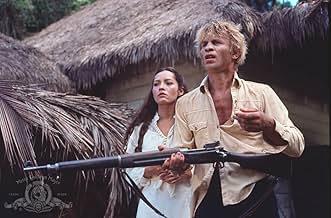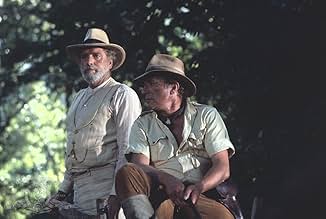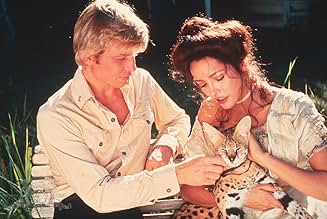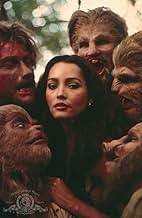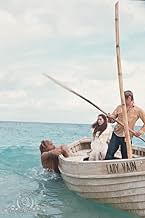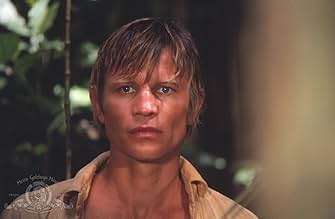AVALIAÇÃO DA IMDb
5,9/10
7,7 mil
SUA AVALIAÇÃO
Adicionar um enredo no seu idiomaA shipwrecked survivor discovers a remote island owned by a crazed scientist who is carrying out sinister experiments on the island's inhabitants.A shipwrecked survivor discovers a remote island owned by a crazed scientist who is carrying out sinister experiments on the island's inhabitants.A shipwrecked survivor discovers a remote island owned by a crazed scientist who is carrying out sinister experiments on the island's inhabitants.
- Direção
- Roteiristas
- Artistas
- Prêmios
- 6 indicações no total
Avaliações em destaque
... although any limitations on what could have been shown or done were much more lax in this film 44 years later. Yet I just like the original better.
This is another take on the H. G. Wells novel about the "mad" scientist experimenting with animals on a South Seas island, performing surgery on them in "the House of Pain" to try to transform them into human beings. Of course, things never go as planned in these films. Moreau is, after all, "tampering in God's domain" (though that hoary old expression is mercifully not used in this film).
Difficult to not compare this version to the first adaption, 1933's Island of Lost Souls, which I find far more satisfactory. In the original Charles Laughton brought a creepy, perverse quality to his Moreau. He was unsettling but effective, and when he cracked that whip in the "What is the law?" scene with the man beasts there was more than a hint of the sadist about him.
The surprising casting of Burt Lancaster as Moreau in the 1977 version fails to bring any of these same odious qualities to the film. It's difficult to work up much of a dislike for Lancaster's scientist in spite of his activities. He's still Burt, and he has to battle against his good guy screen persona.
Island of Dr. Moreau also surprisingly jettisons one of the kinkiest aspects of the 1933 film, the Panther Girl, as originally played by Kathleen Burke, his most near perfection human like creation from a beast, with whom Laughton's Moreau is eager to see if an unsuspecting male shipwrecked on his island (Richard Arlen) will be willing to mate.
The '77 version does have beautiful Barbara Carrera slinking around, and she certainly intrigues (well, more than intrigues) Michael York, now in the Arlen role. Lancaster is aware that they are sexually attracted to each other and ready to mate - but to what purpose, since it turns out Carrera is a normal human, and no kind of Panther Girl. There is a hint in her final scene, however, that she may not be quite so normal, after all, but it went by so quickly I wasn't quite certain if it was my imagination.
The man beasts in the original are more effective than here. For starters, you didn't get a really good look at the makeup in the original (outside of a closeup of Bela Lugosi), so much of it is left to the audience's imagination. In the '77 version you see the makeup and, to be honest, it's not so much frightening as it is artificial in appearance (on about a par with that to be found in the original Planet of the Apes).
The '77 version, however, interestingly, does show what happens to the man beasts after everything blows up on the island, something the '33 original left to our imagination. This version also has Moreau strapping down and experimenting with York, something not done in the '33 version. That is one of the more interesting aspects of this production, as well.
In the final analysis, this is a fairly mediocre adaption of the Wells story, but one should still see it to make his own assessment. There would be another version with Brando almost 20 years later, of course. It's been too long since I've seen that version to talk about it, though I do recall disliking it at the time.
This is another take on the H. G. Wells novel about the "mad" scientist experimenting with animals on a South Seas island, performing surgery on them in "the House of Pain" to try to transform them into human beings. Of course, things never go as planned in these films. Moreau is, after all, "tampering in God's domain" (though that hoary old expression is mercifully not used in this film).
Difficult to not compare this version to the first adaption, 1933's Island of Lost Souls, which I find far more satisfactory. In the original Charles Laughton brought a creepy, perverse quality to his Moreau. He was unsettling but effective, and when he cracked that whip in the "What is the law?" scene with the man beasts there was more than a hint of the sadist about him.
The surprising casting of Burt Lancaster as Moreau in the 1977 version fails to bring any of these same odious qualities to the film. It's difficult to work up much of a dislike for Lancaster's scientist in spite of his activities. He's still Burt, and he has to battle against his good guy screen persona.
Island of Dr. Moreau also surprisingly jettisons one of the kinkiest aspects of the 1933 film, the Panther Girl, as originally played by Kathleen Burke, his most near perfection human like creation from a beast, with whom Laughton's Moreau is eager to see if an unsuspecting male shipwrecked on his island (Richard Arlen) will be willing to mate.
The '77 version does have beautiful Barbara Carrera slinking around, and she certainly intrigues (well, more than intrigues) Michael York, now in the Arlen role. Lancaster is aware that they are sexually attracted to each other and ready to mate - but to what purpose, since it turns out Carrera is a normal human, and no kind of Panther Girl. There is a hint in her final scene, however, that she may not be quite so normal, after all, but it went by so quickly I wasn't quite certain if it was my imagination.
The man beasts in the original are more effective than here. For starters, you didn't get a really good look at the makeup in the original (outside of a closeup of Bela Lugosi), so much of it is left to the audience's imagination. In the '77 version you see the makeup and, to be honest, it's not so much frightening as it is artificial in appearance (on about a par with that to be found in the original Planet of the Apes).
The '77 version, however, interestingly, does show what happens to the man beasts after everything blows up on the island, something the '33 original left to our imagination. This version also has Moreau strapping down and experimenting with York, something not done in the '33 version. That is one of the more interesting aspects of this production, as well.
In the final analysis, this is a fairly mediocre adaption of the Wells story, but one should still see it to make his own assessment. There would be another version with Brando almost 20 years later, of course. It's been too long since I've seen that version to talk about it, though I do recall disliking it at the time.
On a desolate island a man (Michael York) discovers that its inhabitants are experimental animals being turned into strange looking humans, all of it the work of a visionary doctor (Burt Lancaster) , as he's horrified to uncover experiment transforming beasts into humans , Humanimals . The mad doctor isolated on the remote island has spent years creating half-men , half-animals , some real abominations . Acceptable adaptation based on H.G. Wells' novel realized by and with remarkable makeup by John Chambers . It's an excitingly produced remake of 1933's ¨Island of the lost souls¨ with Lancaster heading a solid casting as a nutty doctor who develops a process of transforming animals into half-humans at an desolated tropical island . Through experimentation Moreau-Burt has upset the balance of nature . It starts when Michael York is shipwrecked at sea and arrives in a strange island where he's terrified to discover the terrible genetic experiments realized by Dr. Moreau .
Passable horror-fantasy chiller that is developed up and down with some grotesque moments and in other side contains eerie and thrilling scenes. It results to be a strong rendition of H.G. Wells' novel about an isolated scientific who has spent several years creating half-animals turning beasts into half-human . Cast is frankly well. Lancaster's sturdy acting and good secondary casting as Richard Bashehart displaying a magnificent portrayal of one of the beasts ,the law-sayer , Nigel Davenport and a gorgeous Barbara Carrera . Watchable by excellent makeup by the late John Chambers . Colorful cinematography by the classic cameraman Gerry Fisher and thrilling musical score by Laurence Rosenthal. The motion picture is well directed by Don Taylor . He was an actor and director as TV as cinema , he played one of the leads in the Army-Air Force production of Hart's play, "Winged Victory¨ . Returning to civilian life, Taylor resumed his work in pictures with a top role in the trend-setting crime drama ¨The naked city (1948)¨ and played successful films as ¨Destination Gobi , Battleground and Stalag 17¨. In later years Taylor became a film and TV director, being nominated for an Emmy for his direction of an episode of "Night Gallery" (1969). Don met his wife Hazel Court when he directed her in a 1958 episode of "Alfred Hitchcock presents" (1955). Taylor was an expert filmmaker on adventures genre as ¨Adventures of Tom Sawyer¨ , Terror as ¨Damien : Omen 2¨ and science fiction as ¨Island of Dr. Moreau¨, ¨Escape from Planet of Apes¨, and ¨The final of countdown¨. Rating : Good . Acceptable and passable fantasy-terror fare although better viewed in big screen . The movie will appeal to Burt Lancaster devotees who will want to check out his excessive performance .
Other adaptation based on H.G. Wells' known novel are the following : The classic of 1933 titled ¨The island of lost souls¨ by Erle C. Kenton with Charles Laughton , Kathleen Burke , Bela Lugosi and Richard Arlen ; and remade in 1996 , retelling by John Frankenheimer with Marlon Brando -who hams it up a bit- , David Twellis ,Ron Perlman , Fauriza Balk , William Hootkins and Temuera Morrison
Passable horror-fantasy chiller that is developed up and down with some grotesque moments and in other side contains eerie and thrilling scenes. It results to be a strong rendition of H.G. Wells' novel about an isolated scientific who has spent several years creating half-animals turning beasts into half-human . Cast is frankly well. Lancaster's sturdy acting and good secondary casting as Richard Bashehart displaying a magnificent portrayal of one of the beasts ,the law-sayer , Nigel Davenport and a gorgeous Barbara Carrera . Watchable by excellent makeup by the late John Chambers . Colorful cinematography by the classic cameraman Gerry Fisher and thrilling musical score by Laurence Rosenthal. The motion picture is well directed by Don Taylor . He was an actor and director as TV as cinema , he played one of the leads in the Army-Air Force production of Hart's play, "Winged Victory¨ . Returning to civilian life, Taylor resumed his work in pictures with a top role in the trend-setting crime drama ¨The naked city (1948)¨ and played successful films as ¨Destination Gobi , Battleground and Stalag 17¨. In later years Taylor became a film and TV director, being nominated for an Emmy for his direction of an episode of "Night Gallery" (1969). Don met his wife Hazel Court when he directed her in a 1958 episode of "Alfred Hitchcock presents" (1955). Taylor was an expert filmmaker on adventures genre as ¨Adventures of Tom Sawyer¨ , Terror as ¨Damien : Omen 2¨ and science fiction as ¨Island of Dr. Moreau¨, ¨Escape from Planet of Apes¨, and ¨The final of countdown¨. Rating : Good . Acceptable and passable fantasy-terror fare although better viewed in big screen . The movie will appeal to Burt Lancaster devotees who will want to check out his excessive performance .
Other adaptation based on H.G. Wells' known novel are the following : The classic of 1933 titled ¨The island of lost souls¨ by Erle C. Kenton with Charles Laughton , Kathleen Burke , Bela Lugosi and Richard Arlen ; and remade in 1996 , retelling by John Frankenheimer with Marlon Brando -who hams it up a bit- , David Twellis ,Ron Perlman , Fauriza Balk , William Hootkins and Temuera Morrison
I watched this movie by accident, due to a last-minute program change by the TV station. I had missed the first couple of minutes including the title, so I was just as unprepared as the shipwrecked Andrew (Michael York) when he set foot on this beautiful tropical island. To his horror, he finds out that an aging scientist, presumed long dead by the world, has populated the island with his "children," the results of his experiments in combining human and animal genes. What I found most astonishing was the authentic feel to the characters. Starting with Andrew. His initial repulsion develops into a discerning appreciation, without ever condoning the monstrosity of Dr. Moreau's project. The old scientist himself (Burt Lancaster, a rather shallow performance in comparison) is not an evil lunatic but a genius who got carried away, convinced to the end of his own noble goals and best intentions. However, the most amazing aspect is the differentiated portrayal of Moreau's more or less "successful" creatures. The movie manages to make your heart go out for them in their struggle to be human against their nature. The most poignant moment is the Lionman's farewell cry for his Master. An overall very satisfying movie, despite some weaknesses in the development of the plot towards the end (it feels like the director suddenly ran out of time). Quality science-fiction with good entertainment value. 7/10
My friend and I rented The Island of Dr. Moreau (1977). We both enjoyed it and thought the make-up was outstanding. There is some good acting and the story was close to Wells's novel. The remake was awful. This one is much better, so if you want to see a good science fiction movie rent this one. You won't be dissapointed. 7 out of 10.
There's three principal reasons why this HG Wells' inspired horror adventure works, firstly the distinguished cast led by A-graders Michael York (as the shipwrecked engineer) and Burt Lancaster, as the reclusive title character whose gene experiments on the local animal population is resulting in terrible mutations trapped amid instincts that lay somewhere between man and animal, a precariously distorted eco-system.
Nigel Davenport plays the boozy mercenary protecting the island establishment from its own macabre experiments, while Richard Basehart is a transformed animal, human enough to be the law sayer and peace-keeper of the mutated island population. Then there's the ravishing Barbara Carrera as a naive orphan brought to the island as a child by Moreau, besotted by the chivalrous York, but equally mysterious like her young lynx companion. Nick Cravat and Dave Cass have minor supporting roles as manimals of various pedigree.
The second reason to tune in is the set design and make-up effects in which luminaries John Chambers and Dan Striepeke were involved. Moreau's half-breed experiments are impressively brought to life by Chambers' crew, the full effect more evident on close-up, particularly on the unrecognisable Basehart.
Finally, if it needs to be defended, the production of Samuel Z.Arkoff and Sandy Howard should please some, their AIP distribution lending a certain B-movie prestige, a badge that will in itself, attract a legion of fans (but equally, render others suspicious of the quality). Overall, while there were a plethora of plot-holes to be found, and the conclusion a little simplistic, the general tone and quality of the film remained highly entertaining, uncomplicated and straightforward, something the 1996 remake couldn't muster in spite of its (by relative standards) gold plated production.
Nigel Davenport plays the boozy mercenary protecting the island establishment from its own macabre experiments, while Richard Basehart is a transformed animal, human enough to be the law sayer and peace-keeper of the mutated island population. Then there's the ravishing Barbara Carrera as a naive orphan brought to the island as a child by Moreau, besotted by the chivalrous York, but equally mysterious like her young lynx companion. Nick Cravat and Dave Cass have minor supporting roles as manimals of various pedigree.
The second reason to tune in is the set design and make-up effects in which luminaries John Chambers and Dan Striepeke were involved. Moreau's half-breed experiments are impressively brought to life by Chambers' crew, the full effect more evident on close-up, particularly on the unrecognisable Basehart.
Finally, if it needs to be defended, the production of Samuel Z.Arkoff and Sandy Howard should please some, their AIP distribution lending a certain B-movie prestige, a badge that will in itself, attract a legion of fans (but equally, render others suspicious of the quality). Overall, while there were a plethora of plot-holes to be found, and the conclusion a little simplistic, the general tone and quality of the film remained highly entertaining, uncomplicated and straightforward, something the 1996 remake couldn't muster in spite of its (by relative standards) gold plated production.
Você sabia?
- CuriosidadesDuring the fight between the bullman and the tiger, the animal actually took the stuntman's head in his jaws. Luckily he was wearing a fiberglass helmet which protected him.
- Erros de gravaçãoDuring the opening scene when the boat is being pushed ashore you can see the shadow of the boom mic in the water's edge.
- Citações
Sayer of the Law: [about Moreau] His is the hand that makes. His is the hand that hurts. His is the hand that heals. His is the House of Pain. His is the House of Pain. His is the House of Pain. He who breaks the law shall be punished back to the House of Pain.
- ConexõesFeatured in A Century of Science Fiction (1996)
- Trilhas sonorasDer Vogelfänger bin ich ja
(Papageno's Aria from "Die Zauberflöte" K.620)
Written by Wolfgang Amadeus Mozart
Principais escolhas
Faça login para avaliar e ver a lista de recomendações personalizadas
Detalhes
- Data de lançamento
- País de origem
- Central de atendimento oficial
- Idioma
- Também conhecido como
- The Island of Dr. Moreau
- Locações de filme
- Empresas de produção
- Consulte mais créditos da empresa na IMDbPro
Bilheteria
- Orçamento
- US$ 6.000.000 (estimativa)
Contribua para esta página
Sugerir uma alteração ou adicionar conteúdo ausente


